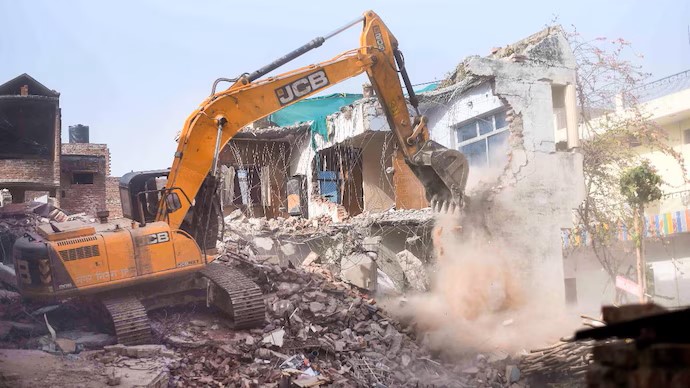10 Jul. 24: In a controversial series of events, India has seen a staggering number of demolitions over the past two years, leaving over 1.5 lakh homes and other structures razed and approximately 7.38 lakh people homeless. These actions, primarily affecting Muslims and other marginalized communities, have sparked widespread criticism and concern over the state’s approach to urban development and encroachment removal, writes Anuj Behal in the Frontline.
The story begins with the recent massive demolition in Akbarnagar. On June 19, a significant eviction drive in Lucknow’s Akbarnagar saw the demolition of around 1,800 structures, including 1,169 houses and 101 commercial establishments. The state government aims to transform this area into the Kukrail Riverfront, an ecotourism hub. Residents, many of whom have lived there for decades, protested the demolitions. Vishnu Kashyap, a local resident, expressed his distress: “Our houses will be demolished, and now the government will make a riverfront here. You tell me what is more important, a poor person’s house or a riverfront?”
Government officials defended the demolitions, claiming the area was encroached upon by illegal constructions, including those by alleged land mafias and infiltrators.
This trend is not limited to Uttar Pradesh. Maharashtra and Madhya Pradesh have also experienced similar actions. In Madhya Pradesh’s Mandla district, 11 Muslim homes were demolished on June 15 following allegations of beef being found in their refrigerators. In Mumbai’s Powai area, the Brihanmumbai Municipal Corporation demolished 600 makeshift settlements in Jai Bhim Nagar, a Dalit basti, displacing 3,500 people.
The repeated demolitions have led to numerous tragic stories. Manoj, a resident of Delhi’s Shahdara, has faced multiple evictions, with his settlement being demolished twice in two years. “When they first demolished our settlement in September 2022, we had nowhere else to go. This place has always been our home,” he lamented.
Data from the Housing and Land Rights Network (HLRN) reveals a sharp increase in evictions, with 1,53,820 homes demolished in 2022 and 2023, displacing over 7.38 lakh individuals. The number of people affected by evictions has risen dramatically, from 1,07,625 in 2019 to 5,15,752 in 2023.
The use of demolitions as a punitive measure has become more common, particularly in BJP-ruled states. In Delhi’s Jahangirpuri and Madhya Pradesh’s Khargone, demolitions followed communal clashes, primarily targeting Muslim-owned properties. An Amnesty International report highlighted that Muslims were disproportionately affected, with 128 demolitions impacting 617 people.
The Frontline story confirms that many demolitions have been criticized for failing to follow due process, often occurring without adequate notice or during adverse conditions. The Delhi High Court and the Supreme Court have both addressed the issue, emphasizing the need for proper procedures and rehabilitation. However, housing rights activists report increasing difficulties in securing legal protections against these actions.
The ongoing demolitions have raised serious questions about the balance between urban development and human rights. As more communities face displacement, the government’s approach to handling encroachments and development projects continues to be a contentious and urgent issue.




